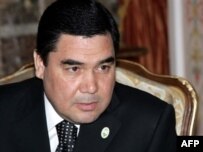Turkmen president vows to press on with constitutional reform
| Publisher | Radio Free Europe/Radio Liberty |
| Author | Reuters |
| Publication Date | 23 July 2008 |
| Cite as | Radio Free Europe/Radio Liberty, Turkmen president vows to press on with constitutional reform, 23 July 2008, available at: https://www.refworld.org/docid/4889d0872d.html [accessed 3 June 2023] |
| Disclaimer | This is not a UNHCR publication. UNHCR is not responsible for, nor does it necessarily endorse, its content. Any views expressed are solely those of the author or publisher and do not necessarily reflect those of UNHCR, the United Nations or its Member States. |
July 23, 2008
By Reuters
 Turkmen President Gurbanguly Berdymukhammedov
Turkmen President Gurbanguly Berdymukhammedov
ASHGABAT – Turkmenistan's leader has said he wants to overhaul the gas producer's constitution to reflect its commitment to market economics, democracy, and human rights.
The new more liberal constitution, due to come into force this year, has however failed to stem criticism from human rights groups over the slow pace of reform in Turkmenistan.
The basic law replaces a more autocratic text drafted to suit the late Saparmurat Niyazov, who ruled Central Asia's biggest gas producer for 21 years and tolerated no dissent.
"Reforming the constitutional basis of society and state is a true necessity triggered by the objective conditions of the era of new renaissance," said President Gurbanguly Berdymukhammedov, using a phrase coined by him to describe Turkmenistan's reformist drive under his leadership.
The speech was published on July 22.
Era Of Liberalism?
Berdymukhammedov came to power in late 2006, raising hopes that he would usher in an era of liberalism following the death of absolute leader Niyazov.
Reforming the constitutional basis of society and state is a true necessity triggered by the objective conditions of the era of new renaissance.Earlier this year, Berdymukhammedov urged officials to revise the Niyazov era as part of his push to open up the long-isolated state, attract more foreign investment, and play a more active role in regional affairs.
But Western rights groups have accused him of lacking a clear drive towards democracy, saying political and media freedoms have improved little since Niyazov's time.
Berdymukhammedov vowed to push on, saying his reforms aimed to make the country more democratic.
Key Elements Of New Constitution
Below are the key elements of Turkmenistan's draft new constitution, published in the official media and expected to be signed into law as soon an September this year.
The new constitution:
- Abolishes the Halk Maslahaty, or People's Council, a powerful Niyazov-era legislative body consisting of some 2,500 deputies who were essentially hand-picked by the president.
- Pronounces the Mejlis parliament as the top legislative body and fixes its size at 125 elected deputies with a tenure of five years.
- Fixes the presidential term at five years in office. Officials had previously urged the Turkmen leader to extend the term to seven years, raising concerns in the West.
- Fixes Turkmenistan's commitment to market economy principles. Article 10: "Turkmenistan develops its economy by striving at a market economy based on private, state, and other forms of property. The state encourages entrepreneurship and supports the development of small and mid-size business."
- Vows to protect private property including land ownership.
- Allows private investors to set up educational facilities.
